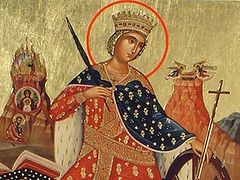Dear brothers and sisters!
 Photo: ekbmiloserdie.ru For those who live according to the flesh, their birthday is the most important day of the year. For those who live according to the spirit, the day of the resurrection of the soul from eternal death is the most important day, not only of the year, but in their entire life.
Photo: ekbmiloserdie.ru For those who live according to the flesh, their birthday is the most important day of the year. For those who live according to the spirit, the day of the resurrection of the soul from eternal death is the most important day, not only of the year, but in their entire life.
Therefore, in commemorating a saint, the Church doesn’t remember and doesn’t look to find out from historians what day he was born, but testifies before God about the day on which he was resurrected—specifically resurrected, because death for the sake of the Lord Jesus Christ or the ascetic feats of piety that the saints performed are the beginning of eternal life, the true resurrection in the Holy Spirit before the general resurrection of bodies. Physical death doesn’t have complete power over saints. It becomes only a temporary qualitative change in the life of a God-pleasing person. They’re completely delivered from the eternal death that may come after the universal judgment of Christ.
Today we glorify St. Catherine, in whose life this mystery of the spiritual life was revealed with tremendous force. It’s not only that she was reborn in spirit, but many around her who didn’t know the One true God became faithful to Him. You all know the life of St. Catherine, an eighteen-year-old girl from Alexandria who, knowing the joy of communion with Christ, rejected all the worldly pleasures and delights that were readily available to her as a daughter in the royal family. She followed Christ so decisively that many pagans, after briefly conversing with her, became Christian martyrs. First, she converted fifty pagan philosophers to God, then the wife of the pagan emperor, Augustus, then the commander Porphyry and 200 soldiers. After that, she gave her soul to God, accepting death at the hands of tormentors.
For modern man, the life of the Great Martyr Catherine is something extreme, hard to imagine, almost like a fairy tale. And why is that? Because modern man lives differently, enslaved by comfort. Pleasure and enjoyment have become the main incentives in life. Living by faith, renouncing pleasures for the sake of Christ, has become a thing of the past.
The life of the holy Great Martyr Catherine says that when she was being led to execution, the Alexandrian women tried in every possible way to persuade her to take mercy upon herself and submit to the pagan emperor. They clearly didn’t understand the reasons for her obstinacy; they couldn’t imagine how someone could refuse the sea of pleasure offered her in exchange for renouncing Christ. They didn’t understand because they didn’t have true faith—true not only in the sense of correct, but above all, in the sense of deep faith, encompassing the entire soul, which is the foundation and most important value of human life. St. Catherine tried to answer them and called on them to leave aside their useless crying and instead rejoice, because she was about to meet her Heavenly Bridegroom, Christ. “Weep not for me, but for yourselves,” St. Catherine said, “because your unbelief will lead you into the endless fire to suffer forever.”
It’s not known whether these women heard her words. However, it’s important that we hear these words. For quite often our progress along the path of the spiritual life is inhibited or even halted because of our lack of faith and love of pleasure, because of our inability to make a volitional effort over ourselves and somehow limit ourselves. It often happens that a man who is seemingly intelligent and sensitive yet whose will is damaged by sin remains a spiritual invalid until the end of his life, drowning day after day in the same sins, because in order to take the next step on the path of the spiritual life, he must step over his “beloved” sins, for which he lacks the necessary willpower. It sometimes happens that such a man is even afraid to pray for deliverance from such sins.
St. Seraphim of Sarov, when asked why we don’t find such great ascetics of piety with whom the Church abounded in the first centuries of its existence in our day, would answer that modern believers don’t have the determination to live according to the commandments of God that people had in antiquity. But God gives strengthening grace from above precisely in accordance with our determination to follow Him. In this regard, St. Catherine is an obvious example. Resolutely abandoning the life of glory and luxury she was accustomed to, she was immediately filled with such grace-filled power that when she drew a cross on a stone with her finger, the impression immediately appeared as if she had drawn on sand rather than a rock. And further in her life, she overcame all temptations not by her natural powers, but by the power of God that worked through her. We can say the saint allowed her tormentors to kill her, because before that they repeatedly subjected her to deadly tortures, but she didn’t die.
When we remember her labors, the question inevitably arises: Why is the life of not only the great saints, but a God-pleasing life in general so sorrowful and always paired with suffering? After all, God is good and He loves all people; the world He created is also “very good.” Men are created by God according to His image, so then why does a God-pleasing life lead to suffering; why does the Savior teach that strait is the gate, and narrow is the way, which leadeth unto life (Mt. 7:14); why does the Apostle Paul say that all that will live godly in Christ Jesus shall suffer persecution (2 Tim. 3:12)?
This is both a very important and difficult question, and its answer lies in the fact that after the Fall of our forefathers, good was mixed with evil in the nature of every man. They’re mixed so thoroughly that indulging in both good and evil has become something natural. In the darkness of abandonment by God, man can’t discern the movements of good and evil within himself. Everything seems natural; he strives to do everything he wants, failing to distinguish God-pleasing deeds from sin. Only in the light of the Gospel, by comparing his life with the commandments of Christ, does the believer gradually come to realize how sinful are his desires and aspirations.
And if he starts living according to the Savior’s commandments, then good is separated from evil within him—that spiritual purification written about by the Holy Fathers. This takes place with pain and suffering, because it has become deeply natural for us to live according to the law of sin, and renouncing this life seems almost unnatural. And if not for the grace of Christ strengthening believing souls on this path, none would have been able to be cleansed from sin. Therefore, all those who have embarked on this path must bear its weight, but there’s no other way. Some people’s souls are cleansed by the grace of God over the course of their lifetime, while the souls of others, such as St. Catherine, are purified within a matter of days. This is in the hands of God’s providence. For our part, we must have complete determination and humility to accept His all-powerful activity in our lives, which is carried out through all kinds of temptations, sicknesses, and sorrows.
However, the life of St. Catherine reveals to us not only this much-suffering side of Christian life, but another mystery of the spiritual life is also revealed with greater force: the mystery of recompense. Those who abandoned sinful vices and habits for the sake of faith in the Lord Jesus Christ, and moreover, abandoned even earthly things, received much more of the Heavenly. St. Catherine was from a royal family, and accordingly was offered royal glory, but she received much more from Christ—the Kingdom of Heaven and Divine glory. She was a wise and educated virgin, but in following Christ, she received wisdom from above and recreated and adorned the image of God within herself. She had wealth and nobility, but having left all this behind, she received eternal blessedness and grace for all eternity.
This is also a spiritual consolation for us, the weak and sinful, because everything sinful that we give up in striving to live in a God-pleasing manner will be replaced by the grace of God with a much greater gift from above—this is a law of the spiritual life, and it cannot be otherwise. But in order for this to happen, you have to believe and make the first steps towards God and begin to live as the Lord commands, as the Holy Orthodox Church He founded instructs. St. Catherine did it; the saints did it. All Christians are called to do it—to experience the power of God’s words: He that hath My commandments, and keepeth them, he it is that loveth Me: and he that loveth Me shall be loved of My Father, and I will love him, and will manifest Myself to him (Jn. 14:21).
Amen.



